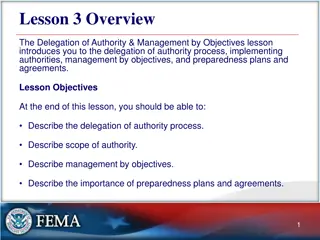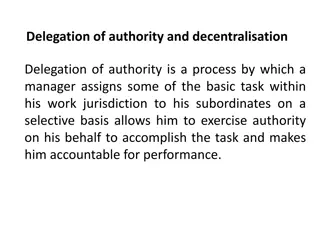
Art of Delegation in Organizational Management
Delegation in organizational management involves the strategic assignment of tasks to subordinates with the necessary authority and responsibility. Explore the features, process, and importance of delegation for effective coordination and efficiency within an organization.
Download Presentation

Please find below an Image/Link to download the presentation.
The content on the website is provided AS IS for your information and personal use only. It may not be sold, licensed, or shared on other websites without obtaining consent from the author. If you encounter any issues during the download, it is possible that the publisher has removed the file from their server.
You are allowed to download the files provided on this website for personal or commercial use, subject to the condition that they are used lawfully. All files are the property of their respective owners.
The content on the website is provided AS IS for your information and personal use only. It may not be sold, licensed, or shared on other websites without obtaining consent from the author.
E N D
Presentation Transcript
DELEGATION DELEGATION Delegation means to grant or confer. It helps to coordinate activities at various levels to increase efficiency of the organisation. It helps managers to concentrate on important organisational matters and pass the routine matters to subordinates . If all organisational activities, strategic and routine, could be managed by one person, the need for formal organisation structure with different functional departments, staffed with people of different skills, carrying out different activities would not arise. Since it is not possible for one person to perform all activities with respect to all functional areas because of physic and mental limitations, it becomes essential that he gives part of his work load to subordinates. Managers have to decide the tasks that can be performed by subordinates and along with authority to carry out the assigned task. Any type of task cannot be assigned those which have to be carried out by them only. Thus, the entire workload is divided units, a part is assigned to subordinates along with authority to carry out the assigned t This concept of division of work and assignment to people down the scalar chain is called delegation.
Delegation is "the assignment of part of a manager's work to others along with both the responsibility and the authority necessary to achieve expected results . "Delegation is the process by which a manager assigns tasks and authority to subordinate who accept responsibility for those jobs."
Features of Delegation Features of Delegation Delegation has the following features: 1.Delegation is a process: Managers delegate tasks in a sequential order of steps. 2. On-going process: Delegation is a continuous process. Managers continue to delegate tasks to subordinates and get them delegated by their superiors to achieve the organisational goals. 3. An art, not science: Delegation does not necessarily mean that subordinates will perform those tasks well. There is no cause and effect relationship between the task assigned and their actual performance. Delegation is, thus, not a science. It is the art of how well and what the manager delegates to subordinates. 4. Delegation of authority and not accountability: Managers can only delegate work and authority to perform that work. Delegation does not absolve managers of accountability their superiors for the part of task assigned to subordinates. They remain accountable for the tasks assigned to subordinates and are answerable to their superiors for its performance Thus, responsibility (tasks) and authority can be delegated but not accountability 5.Different forms: Delegation can take different forms. It can be downward, upward lateral 6.Necessary activity: Managers cannot avoid delegation. They cannot perform all the tasks themselves. They have to learn the art of delegation, that is, how to delegate and what to delegate.
Process of Delegation The process of delegation involves the following steps: 1.Determine the goals: The manager establishes the goal or objective of the position so that the person at that position knows what is expected of him. If delegation is to be initiated in the sales department, the objective should be made clear, sales promotion or sales retention. All organisational activities are goal oriented. If every position knows its responsibility regarding what and how work has to contribute to the goal, delegation will be effective. Unless the goal are clear, the units/individuals would not know in which direction the delegated authority to be used. 2. Responsibility: Once requirement of the job is defined, the responsibility of members is determined in terms of tasks assigned to them. Tasks should be assigned in terms of results expected so that employees work towards measurable standards. Selling 10,000 units pe month' is better understood than saying 'sell as much as you can. When employees know what goals to fulfil and the criterion against which their performance will be judged, they will perform their duties better. Responsibility also defines their relationship with the superiors to whom they are accountable and subordinates to whom they can give instructions.
3. Authority: The job having been assigned, authority is given so that subordinates can efficiently discharge responsibilities related to that job. Authority defines the right of subordinates to further give instructions to carry out the assigned responsibilities. It defines the boundaries within which subordinates shall work the actions they can perform and those they cannot perform. Authority permits the subordinates to take action on tasks delegated by spending resources, making organisational commitments, issuing further order to members of their unit etc . Authority must be commensurate with responsibility. More the responsibility, more the authority and vice versa. 4. Motivation: The duty of manager does not end by delegating authority and responsibilities He makes sure that subordinates willingly contribute to the job assigned to optimally achieve the organisational goals. Managers motivate the subordinates to do their work with zeal and enthusiasm. They use financial and non-financial (participative decision-making, recognition etc.) incentives to motivate the subordinates . The need for acceptance and recognition are important motivators that boost employees morale to perform the delegated tasks. "The desire for recognition or ego satisfaction is central to other incentives in motivating people."
5. Training: Despite giving authority commensurate with responsibility, subordinates may not be able to effectively carry out the delegated tasks. Managers, therefore, organise training programmes to enhance their knowledge on the tasks delegated. 6. Control: Specific standards of performance are communicated to enable the subordinates assess their performance against standards, control and coordinate their activities with goals of the organisation. 7. Accountability: Whatever the nature and extent of delegation, managers constantly observe the activities of subordinates, reviews their progress and provide guidance, whenever necessary. They hold them accountable for the work assigned but remain ultimately accountable to their superiors for completion of each task and its coordination with the overall organisational work.
Importance of Delegation Importance of Delegation Delegation is unavoidable. Managers have to be skilled in the art of delegation. It has the following merits: 1. Relief to managers: Delegation relieves managers of the burden to carry out every activity on their own. By delegating routine activities to lower levels, top managers concentrate on important policy matters. This increase efficiency of the organisation. 2. Develops managers: By delegating authority and responsibility to subordinates, managers can accept more and responsibilities from their superiors. By delegating routine jobs down the hierarchy, they can take more challenging projects and enhance their skills as competent managers.
3. Develops subordinates: When routine and innovative tasks are delegated to subordinates , their skill in performing the delegated tasks increases. Training programmes can be organised to develop them as potential managers. 4. Better decisions: Through delegation, decisions related to routine matters are taken by those who are closest to the decision-making situation. This increases the quality of decisions. 5. Faster decisions: Not only are the decisions effective, they are also fast as subordinates have the authority to do the jobs assigned without going to the superiors every time they face a problem. They have authority to solve the problems on their own.
6. Specialisation: Division of work into sub-units and delegation of responsibilities according to skill, knowledge and competence of subordinates promotes specialisation on the job and results in greater output. "Delegation provides a way to break down the responsibilities of a manager and assign them across several subordinate managers based on their specialised capability. 7. Job satisfaction: When subordinates achieve the delegated standards of performance, its provides them job satisfaction and motivates them to perform better. 8. Promotes inter-personal relationships: Delegation increases interaction of managers with the subordinates and promotes healthy relationships amongst them . The advantages of delegation rightly enable a manager to multiply himself.






















